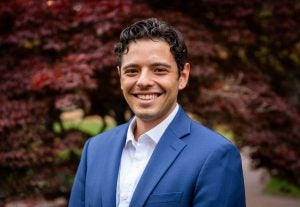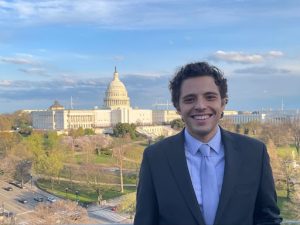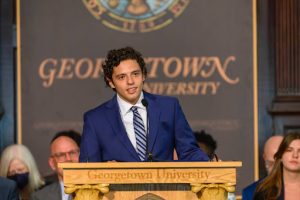 Adrian Ali-Caccamo (SFS‘24), a senior and advocate for equity in U.S. education, has won the 2024 Marshall Scholarship. Ali-Caccamo is among 51 Marshall Scholarship recipients nationwide, and he joins the ranks of the five Georgetown students and alumni who have received the scholarship this year. The Marshall selects outstanding students from around the world who demonstrate academic excellence to study in the United Kingdom. With his scholarship, Ali-Caccamo will pursue his studies in education and public policy. The Georgetown Center for Research and Fellowships oversees the Marshall Scholarship and several other UK fellowships, guiding students through the nomination and development process.
Adrian Ali-Caccamo (SFS‘24), a senior and advocate for equity in U.S. education, has won the 2024 Marshall Scholarship. Ali-Caccamo is among 51 Marshall Scholarship recipients nationwide, and he joins the ranks of the five Georgetown students and alumni who have received the scholarship this year. The Marshall selects outstanding students from around the world who demonstrate academic excellence to study in the United Kingdom. With his scholarship, Ali-Caccamo will pursue his studies in education and public policy. The Georgetown Center for Research and Fellowships oversees the Marshall Scholarship and several other UK fellowships, guiding students through the nomination and development process.
Making Education More Equitable
Ali-Caccamo has always been dedicated to tackling inequities in education.
At his high school in St. Paul, Minnesota, where at least 40% of the students were from low-income households, Ali-Caccamo witnessed first-hand the way that under-resourced schools hindered student potential.

Believed to be one of the first people from his high school to matriculate at Georgetown, while on the Hilltop, he was keenly aware of the disparities between his peers’ educational backgrounds and his own. Ali-Caccamo recognized that his own story was indicative of deep-rooted issues in the American education system. And he understood, early on, that the issues he cared about required an expansive approach.
“I was fascinated by Georgetown, not just as an excellent academic experience but as an opportunity to be immersed in the policy world in which hugely consequential decisions are deliberated and executed,” Ali-Caccamo says.
Ali-Caccamo was already used to a global perspective: His grandfather was born in Hyderabad, India. His Italian grandmother hid in bomb shelters in Rome at 5 years old as her city was bombed during WWII. His other grandparents grew up in immigrant families in Illinois, and his younger brother was adopted from south India.
“By college, the notion that the world is interconnected came naturally to me. I thought, and still think, that it would be silly to try and study challenges and phenomena in the United States as somehow separate from the world.”
Increasing Inclusion in SFS, DC
From his first semester at SFS studying international politics, Ali-Caccamo dedicated his time to pursuing equity in education. He became a class representative and president of the SFS Academic Council, where he successfully advocated for the first change to the SFS history core curriculum in 25 years, supported the implementation of an undergraduate South Asian Studies certificate and helped launch the SFS Ambassador and SFS Peer Mentor Programs, which, alongside the Dean’s Office for Diversity, Equity and Inclusion, aims to increase SFS’s outreach to underserved schools and support SFS students from minority populations.
“As a twice-elected president of our Academic Council, I rely on [Adrian’s] judgment on how students feel about decisions I make, and I appreciate his good counsel and broad commitment to the well-being of the School. Adrian’s intellect, leadership, and innate ability to bring people together while advocating for critical student issues are truly extraordinary,” SFS Dean Joel Hellman says.

Ali-Caccamo paired his advocacy with experience in the classroom. Through DC Reads and Georgetown’s partnership with the National Education Equity Lab (NEEL), he tutored students in both primary and secondary education. At the National Education Equity Lab in particular, he directly combatted the barriers he encountered as a student by teaching and mentoring underserved high schoolers in international relations. This role built off his mentorship with the Summer College Immersion Program, where he gave advice and guidance to low-income and first-generation students navigating the college admissions process. In these roles, Ali-Caccamo met with students and provided detailed feedback for their work.
“Adrian truly embodied the ethos of cura personalis in his attending to the needs of all of the NEEL high school students he taught,” Professor Elizabeth Grimm says. “It is impossible to put into words the impact that this level of wisdom, guidance, and support will have for these 35 high school students.”
In his work with students from kindergarten up to their senior year in high school, Ali-Caccamo realized the vital importance of a pre-kindergarten to post-secondary public education system, which he believes is crucial to students’ development and their role in a competitive global economy. Without expansive national reform, he argues, the same disparities will continue to plague education in the U.S.
“I loved the personal connections, the community, and the joy of teaching. But, in each experience, I saw new challenges in the caste system of American education,” Ali-Caccamo says. “The personal-level relationships contributed to systemic level observations: race, zip code, and parental education too often predict a child’s life outcomes in the United States.”
Scholarship on Education Policy
Along with his personal experience, Ali-Caccamo’s approach to educational reforms is informed by rigorous scholarship. Throughout his time at Georgetown, he has written extensively about several issues in education policy, including the role of school resource officers, teachers’ communication of behavioral expectations and school funding.
Ali-Caccamo credits Karolyn Tyson’s Education and Society class with helping him to connect his own observations with the education system at large, where he began developing the topic for his senior thesis. As one of eight students selected to write an honors thesis in the international politics major, he will study the relationship between U.S. aid and the adoption of early grade literacy assessments.

This interest is deeply personal — Ali-Caccamo’s brother, Subin, was adopted from India when he was four, and he began learning English as a second language when he arrived in the United States. Subin began to struggle with reading in elementary school, which was often misattributed to English as a second language or Subin’s own skills. When Subin was diagnosed with dyslexia, however, he was able to get the assistance he needed.
“This showed me two things about the concept of literacy. In the American—and most globalized systems—effective reading instruction is essential. Subin was falling behind in other disciplines, not because he wasn’t good at them but because he couldn’t read the instructions and content. Secondly, we know how to teach children of all different learning abilities how to read, the question is when and where we decide to invest those resources,” Ali-Caccamo says.
In the U.K., Ali-Caccamo hopes to craft empirically-grounded policy interventions that will help address the inequities in U.S. education, driven by his values at every step in the process.
“I focus on education, but that’s not the only pressing challenge we face. Education is intertwined with myriad policies, and equality won’t come easily, but working towards justice is a core piece of my identity,” Ali-Caccamo says.